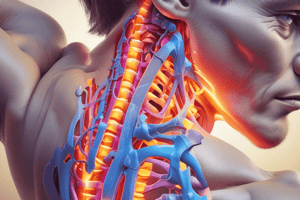Podcast
Questions and Answers
What is a symptom that could indicate myelopathy or spinal cord compromise in the cervical spine region?
What is a symptom that could indicate myelopathy or spinal cord compromise in the cervical spine region?
- Dizziness
- Tingling in the hands and feet
- Chest pain
- Weakness in the upper limb (correct)
What is a question a healthcare professional might ask to assess for cervical arterial dysfunction?
What is a question a healthcare professional might ask to assess for cervical arterial dysfunction?
- Have you noticed any weakness or clumsiness in your hands? (correct)
- Do you have any difficulty with balance or coordination?
- Do you experience any numbness or tingling in your face?
- Do you have any pain in your lower back?
What is a symptom of vertebral and basilar insufficiency?
What is a symptom of vertebral and basilar insufficiency?
- Dyschezia
- Dyspnea
- Dysuria
- Dysphagia (correct)
What is a physical exam test used to assess for vertebral and basilar insufficiency?
What is a physical exam test used to assess for vertebral and basilar insufficiency?
What is a risk factor for upper cervical instability?
What is a risk factor for upper cervical instability?
What is a symptom of thoracic spine pain?
What is a symptom of thoracic spine pain?
What is a question a healthcare professional might ask to assess for thoracic spine pain?
What is a question a healthcare professional might ask to assess for thoracic spine pain?
What is a risk factor for serious spinal pain in the thoracic spine region?
What is a risk factor for serious spinal pain in the thoracic spine region?
What is a characteristic of visceral pain?
What is a characteristic of visceral pain?
What is a risk factor for heart disease?
What is a risk factor for heart disease?
What is a symptom of Cauda Equina syndrome?
What is a symptom of Cauda Equina syndrome?
What is a common cause of serious spinal pain?
What is a common cause of serious spinal pain?
What is a characteristic of autonomic alterations?
What is a characteristic of autonomic alterations?
What is a question to ask a patient with suspected Cauda Equina syndrome?
What is a question to ask a patient with suspected Cauda Equina syndrome?
What is a type of visceral pain related to the abdominal organs?
What is a type of visceral pain related to the abdominal organs?
What is a symptom of Pneumothorax?
What is a symptom of Pneumothorax?
Flashcards are hidden until you start studying
Study Notes
Common CERVICAL Spine Region - Serious Causes of Pain
- Myelopathy/spinal cord compromise: weak UL/LL, paraesthesia, hyperreflexia, clumsiness in hands, gait disturbances, and balance issues
- Cervical arterial dysfunction: coronary artery dissection (CAD), vertebral-basilar insufficiency (VBI), and stroke
- VBI-5D's and 3Ns: dizziness, dysphagia, dysarthria, drop attack, diplopia, numbness (facial), nystagmus, and nausea
- Upper cervical instability: trauma, history of autoimmune inflammatory spinal arthropathy, rheumatoid arthritis, ankylosing spondylitis, Down's and Ehlers-Danlos syndrome, recent surgery, and recent upper respiratory tract infection
Common THORACIC Spine Region - Serious Spinal Pain
- Alerting feature: myocardial ischemia and infarction, chest pain, nausea, risk factors for heart disease, and symptoms that are worse with exertion
- Rib fracture: trauma, pain with breathing and coughing, hearing a crack, and bruising on the skin (ecchymosis)
- Pneumothorax: trauma, shortness of breath, sharp stabbing sudden chest pain, and rapid breathing
- Visceral: stomach, small intestine, pancreas, gallbladder, and liver
Common LUMBAR Spine Region - Causes of Serious Spinal Pain
- Cauda Equina syndrome: early bilateral alternating radiculopathy, leg pain, subjective sphincteric problems, perineal/saddle sensory change, and late altered bladder and bowel function
- Visceral: kidney stones, pancreatitis, and inflammatory bowel disease
Studying That Suits You
Use AI to generate personalized quizzes and flashcards to suit your learning preferences.




